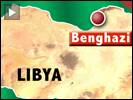
Related
Anti-government protesters have taken control of large swaths of Libya in the uprising against Colonel Muammar Gaddafi. It remains unclear how many people have been killed in Gaddafi’s brutal crackdown, but estimates have topped 1,000. Democracy Now! correspondent Anjali Kamat reports from the Libyan city of Tobruk. [includes rush transcript]
Transcript
AMY GOODMAN: We turn now to Libya. The latest news is that Muammar Gaddafi, the colonel who has been in power for 42 years, is about to give a major address, supposedly, about — oh, let’s see, it’s just coming over the wire now — about 50 kilometers from Tripoli, to address residents in the town of Az Zawiyah. This is according to Al Arabiya Television. But let’s talk about what’s happening throughout Libya. Juan?
JUAN GONZALEZ: Well, anti-government protesters have taken over large sections of the country in the largest uprising ever against Colonel Gaddafi’s rule. The eastern part of Libya is now under opposition rule, with residents in Benghazi, the country’s second-largest city, restoring basic services and setting up informal government systems. In western Libya, early reports said anti-government protesters there have taken control of Misurata, Libya’s third-largest city, about 130 miles from the capital of Tripoli.
But as we go to broadcast, Al Jazeera reports a caller from Misurata says up to 1,000 members of Gaddafi’s forces, the Hamza brigade, mounted an attack on protesters near the city’s airport and were repelled, and later launched an attack on the center of the city.
AMY GOODMAN: On Wednesday, Gaddafi called on thousands of mercenaries and irregular security forces to defend the capital city of Tripoli. People there have said they are too scared to go outdoors because of fears pro-government militias will shoot them on sight. It remains unclear how many people have been killed in Gaddafi’s brutal crackdown, but Italy’s foreign minister says as many as a thousand people may have been killed in the country since the protests began.
Last night, we reached Democracy Now! correspondent Anjali Kamat, who drove across the Libyan border from Egypt. We reached her in the Libyan city of Tobruk.
ANJALI KAMAT: One of the things that was remarkable about getting in today was how welcoming people were to journalists. This is a country that hasn’t allowed in the foreign press for decades. And now, all of a sudden, through this border, foreign journalists are being welcomed with open arms. And that’s because this eastern border with Egypt has fallen to anti-Gaddafi forces. Large parts of eastern Libya, from Benghazi east to the Egyptian border, seem to be completely in the hands of people who call themselves the revolutionaries, the anti-Gaddafi forces, who have taken this part of the country after fierce battles with Gaddafi’s police and mercenaries, who have used incredible violence against a lot of the people here. Even just being here for a few hours, I’ve heard remarkable stories from people going out into the streets and fighting street battles with police, starting in groups of 20 and 30 and then being joined by hundreds more to fight back and fight the police until the police surrendered. So now you have town after town in eastern Libya fully under the control of the people. In fact, when we reached Libya, when we crossed into the border, we were welcomed by the people who were in the uniforms of the Libyan army and who had now defected to the revolutionaries. And everywhere there was graffiti saying, “Welcome to the new Libya. Welcome to the free Libya.”
People are ecstatic. There’s, I think, a sense of incredulity among people here that after 42 years of living under Muammar Gaddafi, they’ve finally tasted freedom for the first time. People are also very nervous, because they’re not sure what might come next. There’s certainly this sense of newfound fearlessness of willing to put their lives on the line. Now that they have tasted freedom, they’re not going to go back, and they’re going to fight. People are willing to fight to the death to keep what they’ve gotten. And there don’t seem to be any police anywhere. All along the routes, there’s checkpoints set up by different groups, some of whom are in the uniform of the Libyan army, some of whom are just young men with guns. They have been incredibly polite and welcoming to us. I came in with two Italian journalists and an Egyptian journalist and met many other American and international journalists along the way, all of whom had a similar experience coming in. Everyone wanted to pose for photographs and was very eager get the message out that we’re now in a free part of Libya and that they’re hoping the revolution will spread westwards.
People are worried, however, about diminishing food and medical supplies. There’s also some worries that the water might be cut off. Right now there is electricity and water and food in the town I’m in, but all the banks have been closed, and cash flow is severely restricted. So people are worried and not sure how much longer this can go on.
But the overwhelming sense is that Gaddafi’s days are numbered. Yesterday’s speech, I think, was quite remarkable, given that he was so absurd at a moment when the state has unleashed so much violence upon its own people. And people are scared and not sure what’s going to come next. People aren’t sure whether, you know, he’s going to bomb his people from the air or the sea. The only hope is that more and more people defect and join the anti-Kaddafi forces. And I think that’s what people are really hoping for and hoping that the example of Benghazi and what they’re calling the “liberated east” will stand as an example and that people under Gaddafi’s control won’t continue to take his orders.
JUAN GONZALEZ: That was Anjali Kamat, Democracy Now! correspondent, speaking to us late last night from Tobruk in eastern Libya.












Media Options